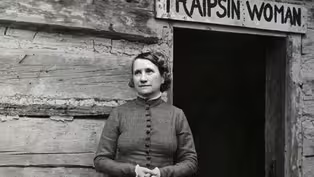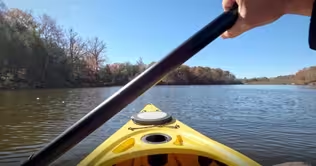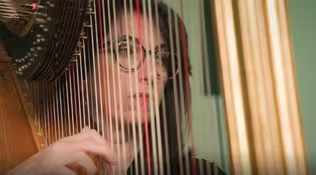
Poets of Kentucky: Frank X Walker
Clip: Season 30 Episode 14 | 7m 17sVideo has Closed Captions
The first African American to hold the honor of Kentucky's Poet Laureate.
Frank X Walker is one of the most accomplished writers and poets to come out of Kentucky. He would go on to become the Kentucky Poet Laureate in 2013, the first African American to hold the honor. Now, his influence can be heard through the generations of poets to come after him, and his impact on the Kentucky writing scene cannot be understated.
Problems playing video? | Closed Captioning Feedback
Problems playing video? | Closed Captioning Feedback
Kentucky Life is a local public television program presented by KET
You give every Kentuckian the opportunity to explore new ideas and new worlds through KET. Visit the Kentucky Life website.

Poets of Kentucky: Frank X Walker
Clip: Season 30 Episode 14 | 7m 17sVideo has Closed Captions
Frank X Walker is one of the most accomplished writers and poets to come out of Kentucky. He would go on to become the Kentucky Poet Laureate in 2013, the first African American to hold the honor. Now, his influence can be heard through the generations of poets to come after him, and his impact on the Kentucky writing scene cannot be understated.
Problems playing video? | Closed Captioning Feedback
How to Watch Kentucky Life
Kentucky Life is available to stream on pbs.org and the free PBS App, available on iPhone, Apple TV, Android TV, Android smartphones, Amazon Fire TV, Amazon Fire Tablet, Roku, Samsung Smart TV, and Vizio.
Providing Support for PBS.org
Learn Moreabout PBS online sponsorshipFrank X Walker is one of the most accomplished writers and poets to come out of Kentucky.
Originally from Danville, Walker forged his own path and gained widespread recognition for his poetry, coining the term “Affrilachia” to highlight the importance of African Americans within the Appalachian region.
He would go on to become the Kentucky Poet Laureate in 2013, the first African American to hold the honor.
Now, his influence can be heard through the generations of poets to come after him.
And his impact on the Kentucky writing scene cannot be underestimated.
Let's take a look.
Grove.
This was the first time we really look at each other and not be able to tell who mastered the cruelest, who sorrow the deepest, who ground been the hardest to hold.
We was lined up like oaks in the yard, all standing with chins up, chest out, shoulders back and already nervous stomachs in.
We was a grove wanting to be a forest, ready to see what kind of wood we made from.
The only thing taller or straighter than us be the boards holding up the barracks at our backs.
Though most of our feats feel pigeon-toed and powerful sore from marching back and forth every day for what seemed like more miles than we walked to get here.
It take more than pride to stand still, these little hats not made for shade.
Soldiering ain't easy, but it sure beats the bloody leaves off a bondage.
Frank X Walker, my Danville, Kentucky native, poet, professor.
I had what I think is a non-traditional childhood I had what I think is a non-traditional childhood because of a couple of things.
The first one is that I had seven sisters growing up, and we didn't have a television in the house, you know, so I had to choose between those sisters or books.
And I chose books, and I hid from my sisters.
I would get flashlights and hide in closets and under beds.
And so, I feel like in a lot of ways I was raised by books.
You know, I became fairly literate early because of that particular situation.
And it changed my life.
Most of my published work is in poetry.
And even that poetry is divided into two categories, either historical poetry or traditional poetry.
The historical poetry centers around the Civil War, and its focus around the area of Camp Nelson, where two of my own ancestors were stationed.
Poets get to do something that historians aren't allowed to do, and that's be emotional.
And I think the emotional temperature and all the bells and whistles that you can use in poetry to make it more musical makes it more accessible and gives people an experience so that when they really get a poem, quite often they are moved.
And I think that's the best thing about the arts is when you combine things like music and lights and the ideal setting and costuming, all the things that poets have to create with words, if we can recreate that, we can insert power into a poem.
Even the way we read it, that really allows people to say, “You know, well, I really get it.” Load in nine times.
John Burnside, Company K, 124th Regiment, US Colored Troops.
Load, I wonder.
Handle cartridge, if I look down.
Tear cartridge, the business end.
Charge cartridge of my musket.
Ram cartridge, and see old Masa.
Return, rammer, standing there.
Prime, if I will hesitate.
Shoulder arms, or remember.
Ready, how many times?
Aim, he beat my wife.
Fire.
[gunfire] The word Appalachia came from trying to explain to myself something that happened in Lexington back in the early ‘90s.
In 1991, the dictionary definition of Appalachian said white residents of the mountainous region of Appalachia.
And that just stunned me.
And I thought, “Well, if that was the definition, what were you if you were not white and you lived in the same area?” I wrote this poem trying to figure it out.
At the very end of the poem, I used the word Affrilachian, took that to my writing group.
They immediately responded to the word.
And they were so excited by the word that by the end of the evening, this unnamed collective decided to name ourselves the Affrilachian Poets.
When I think about the Affrilachian poet model, you know, to give a voice to the voiceless and unmute the muted, it's more about thinking about the ideas of Kentucky and this idea that people of color don't exist here, and the idea that, you know, if you read the literature, you see an absence of people of color.
And it's in response to those absences that, you know, we decided that our collective goal made sense to contribute to that literature, to make sure people knew that not only were we here, that we were here and writing and producing scholarly work and creative work.
And that work was worth paying attention to.
And I think we also had a historical connection and commitment and recognized that we weren't the first people of color here, that we've always been here.
I learned today that Mama, being property, was Master's investment, that taken all together, the only thing more valuable than us was the land, that like the land, I, too, was property and also my mama's interest, same as her increase.
I was the bonus Master got for investing in my mama.
He liked investing so much, his wife say, my green eyes be interesting, by which I think she mean familiar.
I guess they had to sell Mama to profit, to save face, to compound his interest, but to multiply my loss.
Well, I hope that future generations of Affrilachian would say they have a story as well, and that man was a good example and that his work validates their own personal experience and that they feel better about themselves and their region.
If that happens, that's enough for me.
But if they go a step further and say, they also want to teach or write, then I'll be triply pleased that my efforts here were not in vain.
[music playing]
Jean Thomas: The Traipsin' Woman
Video has Closed Captions
Clip: S30 Ep14 | 6m 2s | Jean Thomas traveled through Appalachia documenting traditions of the region. (6m 2s)
Video has Closed Captions
Clip: S30 Ep14 | 4m 54s | Chip explores Kincaid Lake State Park by kayak in Falmouth, Kentucky. (4m 54s)
Video has Closed Captions
Clip: S30 Ep14 | 7m 1s | The Kentucky Harp Society looks to make harps more accessible. (7m 1s)
Providing Support for PBS.org
Learn Moreabout PBS online sponsorshipSupport for PBS provided by:
Kentucky Life is a local public television program presented by KET
You give every Kentuckian the opportunity to explore new ideas and new worlds through KET. Visit the Kentucky Life website.
















